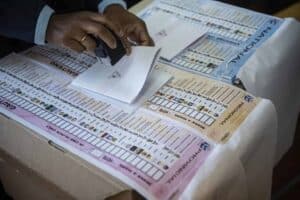E-voting could potentially increase voter turnout and youth participation.

Members of Parliament (MPS) have voiced scepticism about a potential shift from traditional ballot papers to electronic voting (e-voting).
The Independent Electoral Commission (IEC) appeared before the Portfolio Committee on Cooperative Governance and Traditional Affairs (Cogta) on Tuesday to present its considerations for introducing e-voting systems in South Africa.

LIVE interactive map, latest news, multimedia and more!
View MapA six-month public consultation process is currently underway and set to conclude in September.
The feedback gathered will shape a revised policy discussion document, leading to a Green Paper expected by March 2026.
Growing ballot and rising costs
IEC CEO Sy Mamabolo told the committee that the inclusion of independent candidates and a growing number of political parties has made the ballot paper increasingly long and costly.
Mamabolo explained that this has created additional demands for voters.
“Within that broad package of measures we are taking, one of the considerations is the possible introduction of electronic voting.
“We don’t see this as an isolated measure but as a package of interventions, utilising technology to make electoral administration better,” he said.
ALSO READ: Why South Africa’s youth voters are staying away from the polls
However, Mamabolo clarified that no final decision has been made on the implementation of e-voting.
“There is no decision to implement electronic voting precisely because we consider the decision a national policy matter, within the purview of Parliament as a policy-making institution of the country.
“We have not taken that decision, nor are we empowered to make the decision.”
Watch the meeting below:
IEC on e-voting benefits
According to the IEC, e-voting could potentially increase voter turnout and youth participation, both of which have been on the decline.
The commission also noted that the system could expand access to elections, particularly for disadvantaged and marginalised groups, by overcoming linguistic, visual, and physical barriers.
READ MORE: Home affairs minister unveils digital reforms to transform elections
The committee heard that electronic voting could improve electoral efficiency by reducing the time required to count and process votes.
“Traditional manual or paper-based systems are labour-intensive and prone to human error,” Mamabolo said.
He added that digital systems may deliver faster and more accurate results.
MPs concern over IEC e-voting proposal
Despite the possible advantages, several MPs raised significant concerns.
MK Party MP Zwelakhe Mthethwa questioned the timing of the proposal, citing unresolved issues from the 2024 general elections.
“We even have a legal case that is sitting in court, having not resolved an issue of a technical glitch that had far-reaching consequences on our elections last year,” he said.
Mthethwa also raised national cybersecurity vulnerabilities.
“With us being so backwards in terms of ICT as a country, can you imagine our system being hacked as we vote by somebody sitting somewhere in the world and interfering with a serious process wherein we want to elect our leadership?”
Democratic Alliance (DA) MP Anna van Zyl queried the financial implications of adopting e-voting in the short and long term.
READ MORE: IEC official accused of stealing election ballot boxes sees discharge application rejected
She also questioned the privacy of voters in the context of biometric systems.
“Your vote is your secret,” van Zyl said.
Additionally, she expressed concern about the functionality of voter management devices (VMDs) in rural areas where network connectivity is often poor.
Economic Freedom Fighters (EFF) MP Hlengiwe Mkhaliphi pointed to failed e-voting attempts elsewhere.
“What do you hope to achieve differently from those countries such as Namibia?” she asked.
Mkhaliphi referenced ongoing issues with the current voting infrastructure.
“The current VMD is always giving us problems, and it also causes a lot of stress and infighting,” she said.
She warned that persistent challenges like load shedding and unreliable network coverage make South Africa ill-equipped for the technological demands of e-voting.
Call for careful evaluation
Committee chairperson Zweli Mkhize acknowledged that e-voting might become more prevalent in the future, but emphasised the need for thorough groundwork.
He said the problem the IEC plans to solve with e-voting must be clearly identified and that any chosen technology must align with South Africa’s unique context.
Mkhize further underscored the importance of transparency, constitutional compliance, and auditing of the paper trail in any system considered for implementation.






